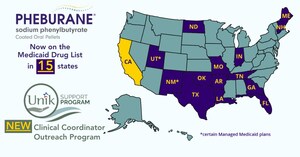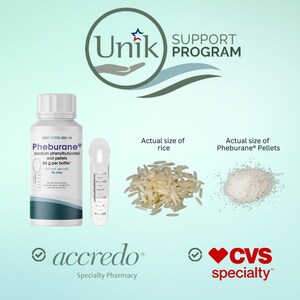ROSEMONT, Pa., Oct. 19, 2020 /PRNewswire/ - Medunik USA is proud to announce that Siklos® (hydroxyurea), indicated to reduce the frequency of painful crises and to reduce the need for blood transfusions in children, 2 years of age and older, with sickle cell anemia with recurrent moderate to severe painful crises1, is now available in a 100 mg scored tablet in addition to the 1,000 mg triple-scored tablets.
Siklos® has a Boxed Warning regarding low blood cell counts and cancer; please read Important Safety Information below.
"Medunik USA is proud to offer pediatric SCA patients a new option that helps optimize daily dosing. With the newly available Siklos® 100 mg scored tablets, dose adjustments can now be made in 50 mg increments. Coupled with Siklos® 1,000 mg triple-scored tablets (4 x 250 mg), this will offer more accurate dose adjustments and may make it more convenient than compounded hydroxyurea," affirmed Tanya Carro, General Manager, at Medunik USA.
The importance of optimal dosing of hydroxyurea in sickle cell anemia (SCA) patients, based on patient body weight and biological and clinical response, has been well established.2,3 This is particularly relevant in pediatric populations, where patient weight is constantly changing.
In addition to its flexible dosing, Siklos® may help increase patient compliance, as it is dissolvable in water for patients who are unable to swallow tablets whole.4 Siklos® tablets should be taken once daily, at the same time every day, with a glass of water. For patients who are not able to swallow the tablets, they can be dispersed immediately before use in a small quantity of water in a teaspoon.
"I can't stress enough the importance of treating pediatric patients as early as possible. Why wait for painful episodes to occur and risk complications when you can give a child Siklos® and reduce the frequency of recurrent painful crises once they turn 2? There's no reason to wait. Physicians and parents need to know about Siklos®!," said Dr. Corey Hebert, MD, Chief Medical Officer at Dillard University and well-known medical broadcast journalist.
Medunik is committed to providing Siklos® at the lowest possible cost to all patients. That is why the company continues to offer cost savings and free home delivery through the Siklos At Home™ program.
For more information about prescribing Siklos® tablets, please visit siklosusa.com.
SIKLOS® (hydroxyurea) tablets, for oral use
WHAT IS SIKLOS?
SIKLOS is a prescription medicine that is used to reduce the frequency of painful crises and reduce the need for blood transfusions in children, 2 years of age and older, with sickle cell anemia with recurrent moderate to severe painful crises.
It is not known if SIKLOS is safe and effective in children less than 2 years of age.
IMPORTANT SAFETY INFORMATION
WARNING: LOW BLOOD CELL COUNT and CANCER
See full prescribing information for complete Boxed Warning.
- Low blood cell counts are common with SIKLOS, including low red blood cells, white blood cells, and platelets, and can be severe and life threatening. If your white blood cell count becomes very low, you are at increased risk for infection. Your healthcare provider will check your blood cell counts before and every 2 weeks during treatment with SIKLOS. Your healthcare provider may change your dose or tell you to stop taking SIKLOS if you have low blood cell counts. Tell your healthcare provider right away if you get any of the following symptoms: fever or chills; shortness of breath; body aches; unusual headache; feeling very tired; bleeding or unexplained bruising.
- Cancer. Some people have developed cancer, such as leukemia and skin cancer, after taking SIKLOS for a long time. Your healthcare provider will check you for cancer. You should protect your skin from the sun using sunblock, hats, and sun-protective clothing.
WHAT IS THE MOST IMPORTANT INFORMATION YOU SHOULD KNOW ABOUT SIKLOS?
- SIKLOS can harm your unborn baby.
- For females taking SIKLOS who can become pregnant:
- You should talk with your healthcare provider about the risks of SIKLOS to your unborn baby.
- You should use effective birth control during treatment with SIKLOS and for at least 6 months after treatment with SIKLOS.
- Your healthcare provider will perform a pregnancy test before you start treatment with SIKLOS. Tell your healthcare provider right away if you become pregnant or think you may be pregnant.
- For males taking SIKLOS: SIKLOS can affect your sperm. If you have a female sexual partner who can become pregnant, you should use effective birth control during treatment with SIKLOS and for at least 6 months after treatment.
- SIKLOS may cause fertility problems in males. Talk to your healthcare provider if this is a concern for you.
WHO SHOULD NOT TAKE SIKLOS
Do not take SIKLOS if you are allergic to hydroxyurea or any of the ingredients in SIKLOS. See the Medication Guide for a list of the ingredients in SIKLOS.
WHAT SHOULD YOU TELL YOUR HEALTH CARE PROVIDER BEFORE TAKING SIKLOS?
Tell your healthcare provider about all of your medical conditions, including if you:
- have kidney problems or are receiving hemodialysis
- have liver problems
- have human immunodeficiency virus (HIV) or take HIV medicines. Taking SIKLOS with certain HIV medicines can cause serious reactions and may lead to death.
- have increased levels of uric acid in your blood (hyperuricemia)
- have a history of receiving interferon therapy or are currently receiving interferon therapy
- have leg wounds or ulcers
- plan to receive any vaccinations. You should not receive "live vaccines" during treatment with SIKLOS.
- are pregnant or plan to become pregnant. See "What is the most important information I should know about SIKLOS?"
- are breastfeeding or plan to breastfeed. It is not known if SIKLOS can pass into your breast milk. Do not breastfeed during treatment with SIKLOS.
Tell your healthcare provider about all the medicines you take, including prescription and over-the-counter medicines, vitamins, and herbal supplements.
WHAT ARE THE POSSIBLE SIDE EFFECTS OF SIKLOS?
SIKLOS may cause serious side effects, including:
See "What is the most important information I should know about SIKLOS?"
- Skin ulcers, including leg ulcers, and death of skin tissue (gangrene) have happened in people who take SIKLOS. This has happened most often in people who receive interferon therapy or have a history of interferon therapy. Your healthcare provider will decrease your dose or stop treatment with SIKLOS if you develop any skin ulcers.
- Enlarged red blood cells (macrocytosis). Macrocytosis is common in people who take SIKLOS and can make it difficult to detect a decrease of folic acid. Your healthcare provider may prescribe a folic acid supplement for you.
The most common side effects of SIKLOS include:
- Infections
- Headache
- Fever
- Skin problems (e.g., skin reactions, dry skin, changes in skin and nail color)
- Stomach and intestine (gastrointestinal) problems (e.g. nausea, constipation)
- Decrease in vitamin D
- Weight gain
These are not all the possible side effects of SIKLOS.
You are encouraged to report negative side effects of prescription drugs to the FDA at www.fda.gov/medwatch, or 1-800-FDA-1088.
Please read the Full Prescribing Information, including Boxed Warning, Medication Guide and Instructions for Use, at www.SIKLOSusa.com.
For more information about SIKLOS, we invite you to contact our Medical Information Service at 1 844-884-5520 or https://www.medunikusa.com/en/medical-information-service.
About Medunik USA
Based in Pennsylvania, Medunik USA works to improve the health and quality of life of Americans living with rare diseases by making orphan drug therapies available in the United States. With strategic partnerships at the global level, the company has critical experience in approval and market access processes as well as the marketing of orphan drug therapies. Medunik USA makes critical medications to treat rare diseases available to American patients who might not otherwise have access to these medications. For more information, visit: www.medunikusa.com.
References
1. Siklos® (hydroxyurea) tablets, for oral use [Prescribing Information]. Addmedica, May 2018
2. Optimizing hydroxyurea therapy for sickle cell anemia, Ware et al. Hematology Am Soc Hematol Educ Program. 2015;2015:436-432.
3. Hydroxyurea for the Treatment of Sickle Cell Disease: Efficacy, Barriers, Toxicity, and Management in Children, Strouse et al. Pediatric Blood Cancer. 2012 August; 59(2): 365–371.
4. Parental and Other Factors Associated with Hydroxyurea Use for Pediatric Sickle Cell Disease, Oyeku et al. Pediatr Blood Cancer. 2013 April ; 60(4): 653–658.
SOURCE Medunik USA

WANT YOUR COMPANY'S NEWS FEATURED ON PRNEWSWIRE.COM?
Newsrooms &
Influencers
Digital Media
Outlets
Journalists
Opted In





Share this article